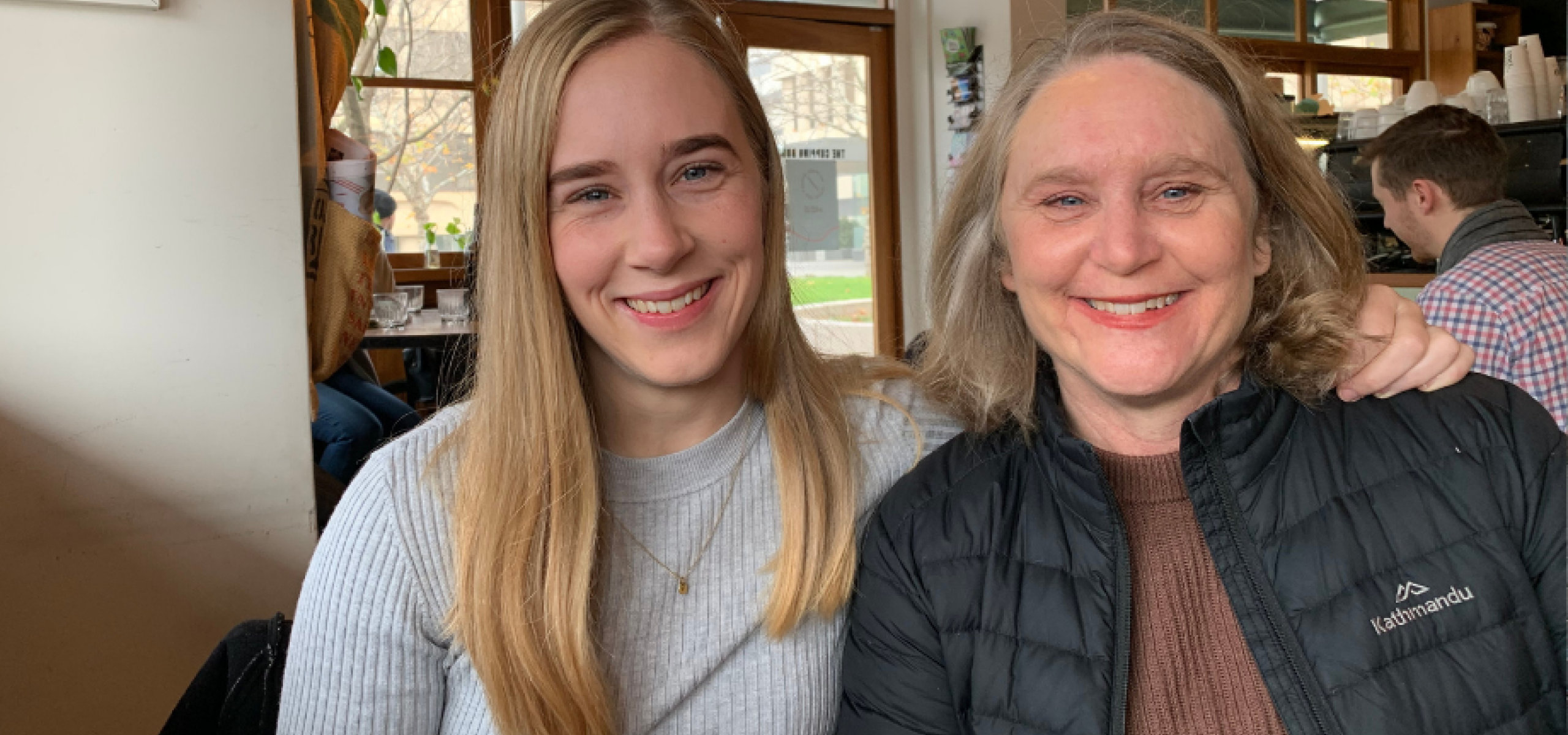
Daughter and mother, Emma and Kate Roff, studied alongside each other at the ANU College of Law.
My mum is thoughtful, generous, intelligent and has an incredible enthusiasm for areas of law that absolutely baffle me.
For many undergraduate students, university is a time for ‘breaking away’ from their parents.
But for Emma Roff, studying a Bachelor of Arts/Law (Hons) at The Australian National University (ANU) actually brought her closer to her mother, Kate, an alumna and current PhD candidate at the ANU College of Law.
“I was really lucky throughout law school that I could always have interesting discussions with mum about what I was studying,” Emma said.
“It was even better when we were both doing our theses at the same time.”
Family law in focus
In 2020, Emma won the Blackburn Medal for Research in Law for her honours thesis examining how the law applies to domestic violence survivors who kill an abusive partner and are subsequently charged with a homicide-related offence.
“The extent to which such survivors can rely on self-defence often depends upon the understanding of the reality of domestic violence among legal actors in the criminal justice system,” Emma said.
Emma’s thesis sought to measure whether amendments to the Victorian Crimes Act 1958 and Jury Directions Act 2015 had contributed to a more nuanced understanding among Victorian judges of domestic violence and its effects.
Accordingly, she found that Victorian judges did have a “better understanding of the nature and dynamics” of domestic violence compared to those in New South Wales.
While Emma was writing her thesis on judicial understanding of survivor-perpetrated homicides, Kate was researching whether interests in discretionary trusts are ‘property’ for the purposes of the Family Law Act 1975 (Cth).
“If an interest in a trust is not ‘property’ then the wealth held on the trust will be beyond the reach of the Federal Circuit and Family Court,” Kate said.
This means the ability of courts to do justice in these kinds of matters can be frustrated.
“I am using this project to explore the way that discretionary trusts are used to secure the benefits of property ownership whilst avoiding the burdens,” she added.
Central to Kate’s research is a survey of a long line of family law decisions which have said that the interests can be ‘property’, but which have been justified on apparently inconsistent bases and which, on recent trends, appear to be narrowing.
“I am using the idea of coherence as a rule-of-law value to inform my evaluation of the family law decisions,” she said.
Academic and professional excellence
Both Kate and Emma found it motivating and helpful to write their theses at the same time.
“Emma gave me lots of practical tips about things like structuring my thesis, referencing, using the library, (ANU learning management system) WATTLE, faculty members and parking at ANU,” Kate said.
However, she also admitted that studying alongside her daughter could be “a little intimidating” at times.
“Emma is one of the most efficient, focused, people I know,” Kate said.
“Although we started our research projects at the same time, she had submitted her thesis before I had even written a single chapter.”
Before she began her PhD, Kate worked as a senior lawyer at the Australian Taxation Office and the Commonwealth Treasury for many years.
“Over the years, I had the opportunity to work on a variety of matters ranging from complex audits of banks and multinationals to high profile law design projects and significant litigation in the Federal Court and High Court,” she said.
While Emma may not share Kate’s passion for tax law and didn’t intend to follow in her footsteps, she believes her mother’s success gave her the confidence to pursue a career in the legal sector.
Emma currently works as a Prosecutor in the Appeals Unit at the ACT Office of the Director of Public Prosecutions.
“It is a fantastic role because I get to work on really interesting legal issues arising from appeals in a range of courts,” she said.
Inspiring each other
When Emma graduated from ANU in 2020, she not only left with the Blackburn Medal, but a number of other accolades under her belt. These included the University Medal, Dean's Certificate for Law Internship and Mick Dodson Prize for Law to name a few.
A highlight of Emma’s studies at ANU was her involvement in various clinical programs offered as electives.
“I did an internship at the Women’s Legal Centre, taught a legal education program at (ACT prison) the Alexander Maconochie Centre, and ran workshops for law students in a university in Myanmar,” she said.
“Those experiences gave me a lot of insight into the privilege of legal knowledge and reinforced that I wanted to be a lawyer.”
Kate is delighted by her daughter’s decision to become a lawyer.
“She has the right temperament for it and, since her earliest days at law school, has displayed an innate understanding of it, both theoretically and practically,” she said. “I know she will make a significant contribution to the law over the course of her career.”
“On a selfish note, it also means I get to have lots of nerdy discussions with her about the law. She constantly surprises me with her insights and her ability to get straight to the nub of a legal issue, even in areas of the law that she is unfamiliar with.”
Kate said Emma inspires her every day, both professionally and personally.
“She is warm-hearted with a strong value set, has a keen intellect, is freakishly efficient and brings determination and tenacity to all the challenges she takes on, including competitive bouldering and caring for her two miniature dachshunds.”
In turn, Emma says she would be lost without her mother.
“My mum is thoughtful, generous, intelligent, and has an incredible enthusiasm for areas of law that absolutely baffle me,” she added.